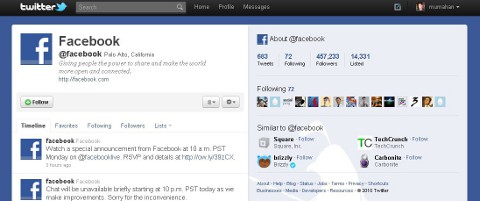
There surely must be some tension between the social media giants, Twitter and Facebook. After all, social media is a fiercely competitive and also very profitable industry. Once in a while, there is a blaring case of irony to make us laugh.
Irony: “… situation in which there is a sharp incongruity or discordance that goes beyond the simple and evident intention of words or actions.” (source: Wikipedia)
Maybe you will not find this as amusing as I do. After all, I laugh at a lot of absurdities that I discover online. Social media is fantastic for a laugh, and I may never get the pictures of people with back-boobs and front-butts out of my head. Yes, that’s right, I said back boobs and front butts. See for yourself at your local Wal Mart store, or follow the humorous links I provided.
Now back to this social media irony of Facebook and Twitter. We have all heard that we should be using Twitter, right? Anybody in the marketing industry will, at a minimum, recommend reserving your brand name at Twitter.com.
Twitter grew like influenza since 2007, and millions of people flocked to the service to find out what a “tweet” is all about. I must say that it was not without merit, and I have participated quite heartily in the conversation surrounding Twitter.
Long before Twitter … centuries before Twitter (in Internet time, of course) we had Facebook. Facebook really hit the world by storm, and grew to over 500 million users in short order. Do you realize how big 500,000,000 is? It is big … very big!
Obviously, Facebook has a stronghold in the social media industry, but we still cannot overlook Twitter for its complex simplicity. I like Twitter enough that I wrote a book about the service, so this is certainly not a bash on Twitter. It is just an observation.
I also like Facebook, and I can spend hours spying on the lives of nearly everybody I ever knew. Then, of course, there are those many companies who do not even see it coming while I am compiling the information I need in order to crush their business with marketing intelligence that I pick up on Facebook.
A logical and meaningful bash against Facebook is like slapping a hungry grizzly bear with a slab of meat and then hoping I can outrun it. It is one of those things that sounds stupid even when smart people say it. Facebook is a winner in the information age. Knock Facebook if you like, but 500 million kind of speaks for itself.
No, this is not a bashing, but I question how they see each other. What is a good way to open a dialog of speculation on how the two social media giants view the others’ service? Make up your own mind on this (and please share your comments), but to me it seems that a look at each of their usage of the others’ service should say something. What it says could be taken different ways, and I will let you chime in with your thoughts.
Twitter on Facebook
Twitter has a Facebook account with hundreds of thousands of fans. My logical assumption would be that Twitter may actually have something more than 140 characters (the character limit on Twitter) to say to all of those adoring fans. Sure, they have a blog, and of course they have Twitter, but it seems that Facebook is not just “the competition”, and it could serve some great uses for Twitter. It seems that Twitter did not ask for, nor act upon my opinion … or the opinion of the 714,256 people who elected to “Like” them on Facebook. As the image below illustrates, “Twitter has no recent posts.” Surely they have something available if you click on “older posts”, right? No … nothing at all. They signed up for an account and did not use it, just the same way as the overwhelming majority of accounts created on Twitter. Irony? Just wait, because there’s more!

Facebook on Twitter
I guess I never really pay much attention to Facebook on Twitter, but they are there, and using the service. When I want to know more about Facebook, I either look at Facebook or find it on one of my favorite Facebook-focused blogs. Facebook really does not need Twitter, but they apparently found value in embracing Twitter as another tool. I commend them on the choice to use Twitter, and it just makes good sense to me.
In contrast to Twitter’s blank Facebook page, Facebook sends updates using Twitter. As illustrated in the image below, Facebook is not a huge user of Twitter, but has sent 683 tweets since their account was created in March 2007.

Does Twitter Really Hate Facebook?
I guess it is a stretch to say that Twitter hates Facebook, but it is pretty clear that they do not have anything to say to the people who chose to “Like” their Facebook page. It seems that they could at least try it out and perhaps come out and say “tweet”.
Podcast: Play in new window | Download


